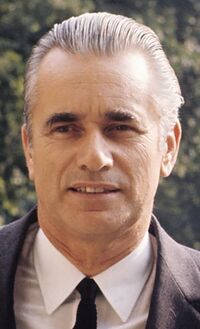Len Resis: Difference between revisions
(Created page with "{{Gylian name|Resis|Len}} {{Infobox officeholder |name = Len Resis |image = LenResis.jpg |image_size = 200px |office = Presid...") |
mNo edit summary |
||
| Line 31: | Line 31: | ||
==Post-war== | ==Post-war== | ||
After the war, Len settled in Déylaŋi, [[Nerveiík-Iárus-Daláyk Region|Nerveiík-Iárus-Daláyk]]. He attended university, completing a degree in {{wpl|public law}}. He worked as a law professor and | After the war, Len settled in Déylaŋi, [[Nerveiík-Iárus-Daláyk Region|Nerveiík-Iárus-Daláyk]]. He attended university, completing a degree in {{wpl|public law}}. He worked as a law professor and [[Judiciary of Gylias#Judicial assistants|judicial assistant]]. | ||
He also became involved in local politics, regularly attending [[Communal assemblies (Gylias)|communal assemblies]] and being a member of the [[Politics of Gylias#Cooperative democracy|municipal advisory council]]. | He also became involved in local politics, regularly attending [[Communal assemblies (Gylias)|communal assemblies]] and being a member of the [[Politics of Gylias#Cooperative democracy|municipal advisory council]]. | ||
Revision as of 10:10, 4 July 2021
Len Resis | |
|---|---|
 | |
| President of Gylias | |
| In office 1 February 1981 – 1 February 1986 | |
| Prime Minister | Aén Ďanez |
| Preceded by | Seşas Ríseu |
| Succeeded by | Sáe Nyran |
| Personal details | |
| Born | 5 March 1926 Villanova, Alscia |
| Died | 11 November 1997 (aged 71) Mişeyáke, Mişeyáke, Gylias |
| Political party | People's Radical Reformist Alliance |
Len Resis (5 March 1926 – 11 November 1997) was a Gylian revolutionary and politician. He served as President of Gylias from 1981 to 1986.
Early life
He was born in Villanova on 5 March 1926. His parents worked as an automobile engineer and a music teacher.
A mediocre student, his formal education was interrupted by Alscia joining the Free Territories in 1939. His family would remain in Molise, now part of Cacerta, where he continued to attend school. He was talented at sports, and played rugby for much of his life.
Liberation War
Len moved to the Free Territories after completing secondary education. He fought in the Liberation War as a member of a liberal militia, which later allied with the People's Army in the second phase of the war.
He joined the People's Radical Reformist Alliance during the war.
Post-war
After the war, Len settled in Déylaŋi, Nerveiík-Iárus-Daláyk. He attended university, completing a degree in public law. He worked as a law professor and judicial assistant.
He also became involved in local politics, regularly attending communal assemblies and being a member of the municipal advisory council.
In 1980, he expressed interest in representing the Liberal Union in the upcoming presidential election. By his own account, he won the primary election "almost by default", as the LU still felt demoralised by its ongoing struggles during the wretched decade.
Presidency
Len was the LU's candidate in the 1981 presidential election. He proved to be an effective campaigner, and got along well on a personal level wtih the opposing candidates, being praised by Françoise Chatelain as "a wonderful gentleman". He won a plurality of first preference votes, and defeated Doris Duranti in the final round by 53,4% to 46,6%.
Len was strongly centrist by LU standards, reflecting the greater conservative influence of southern Gylias. He was appalled by the wretched decade and sought to use his office to combat the ongoing crises. While well-intentioned, his methods provoked controversy, with critics charging that he overstepped the bounds of the presidency.
The quintessential illustration of this was his decision to promote "enterprise" as the main theme of his presidency. Although he took pains to emphasise that he meant "enterprise" in a mutualist sense — defined by community markets and unionised cooperatives —, choosing such an economistic theme caused controversy and drew complaints that he was bringing the office into day-to-day politics.
While his popularity had declined and stagnated towards the end of his term, most analysts still thought he had a chance to win re-election. However, it was the hung parliament elected in the 1985 that changed the situation. Len's attempts to intervene and push for the formation of a new government proved counter-productive. His personal suggestion, a grand coalition between the National Bloc, Progressive Alliance, Liberal Union, and Centre Group alone, annoyed the Non-inscrits, who collectively formed the largest parliamentary group.
He announced in late 1985 that he wouldn't seek re-election, saying, "It's clear to me that a new President is necessary to find a way out of this crisis." He was replaced as the LU presidential candidate by Clarissa Rossetti.
Later life and death
Len resumed his academic career after the presidency, and took early retirement in 1990.
He made several other attempts to seek office, but he lost elections for Mayor of Déylaŋi, the Nerveiík-Iárus-Daláyk Regional Council, and in a local circonscription during the 1995 federal election.
He died of a heart attack in his Mişeyáke apartment on 11 November 1997.
Private life
Len was married twice, the first ending in divorce, and had 4 children. He identified as an atheist.
He was passionate about sports and played several semi-professionally, including rugby (as a left-winger in the 11th position), tennis, and contract bridge.